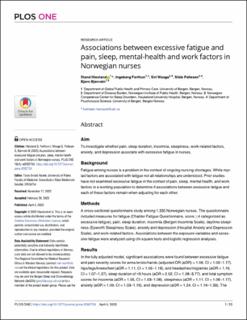| dc.description.abstract | Aim
To investigate whether pain, sleep duration, insomnia, sleepiness, work-related factors, anxiety, and depression associate with excessive fatigue in nurses.
Background
Fatigue among nurses is a problem in the context of ongoing nursing shortages. While myriad factors are associated with fatigue not all relationships are understood. Prior studies have not examined excessive fatigue in the context of pain, sleep, mental health, and work factors in a working population to determine if associations between excessive fatigue and each of these factors remain when adjusting for each other.
Methods
A cross-sectional questionnaire study among 1,335 Norwegian nurses. The questionnaire included measures for fatigue (Chalder Fatigue Questionnaire, score ≥4 categorized as excessive fatigue), pain, sleep duration, insomnia (Bergen Insomnia Scale), daytime sleepiness (Epworth Sleepiness Scale), anxiety and depression (Hospital Anxiety and Depression Scale), and work-related factors. Associations between the exposure variables and excessive fatigue were analyzed using chi-square tests and logistic regression analyses.
Results
In the fully adjusted model, significant associations were found between excessive fatigue and pain severity scores for arms/wrists/hands (adjusted OR (aOR) = 1.09, CI = 1.02–1.17), hips/legs/knees/feet (aOR = 1.11, CI = 1.05–1.18), and headaches/migraines (aOR = 1.16, CI = 1.07–1.27), sleep duration of <6 hours (aOR = 2.02, CI = 1.08–3.77), and total symptom scores for insomnia (aOR = 1.05, CI = 1.03–1.08), sleepiness (aOR = 1.11, CI = 1.06–1.17), anxiety (aOR = 1.09, CI = 1.03–1.16), and depression (aOR = 1.24, CI = 1.16–1.33). The musculoskeletal complaint-severity index score (aOR = 1.27, CI = 1.13–1.42) was associated with excessive fatigue in a separate model adjusted for all variables and demographics. Excessive fatigue was also associated with shift work disorder (OR = 2.25, CI = 1.76–2.89) in a model adjusted for demographics. We found no associations with shift work, number of night shifts and number of quick returns (<11 hours between shifts) in the fully adjusted model.
Conclusion
Excessive fatigue was associated with pain, sleep- and mental health-factors in a fully adjusted model. | en_US |

